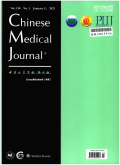Activating transcription factor 4 protects mice against sepsis-induced intestinal injury by regulating gut-resident macrophages differentiation
Activating transcription factor 4 protects mice against sepsis-induced intestinal injury by regulating gut-resident macrophages differentiation
摘要Background::Gut-resident macrophages (gMacs) supplemented by monocytes-to-gMacs differentiation play a critical role in maintaining intestinal homeostasis. Activating transcription factor 4 (ATF4) is involved in immune cell differentiation. We therefore set out to investigate the role of ATF4-regulated monocytes-to-gMacs differentiation in sepsis-induced intestinal injury.Methods::Sepsis was induced in C57BL/6 wild type (WT) mice and Atf4-knockdown ( Atf4+/-) mice by cecal ligation and puncture or administration of lipopolysaccharide (LPS). Colon, peripheral blood mononuclear cells, sera, lung, liver, and mesenteric lymph nodes were collected for flow cytometry, hematoxylin and eosin staining, immunohistochemistry, quantitative reverse transcription polymerase chain reaction, and enzyme-linked immunosorbent assay, respectively. Results::CD64, CD11b, Ly6C, major histocompatibility complex-II (MHC-II), CX3CR1, Ly6G, and SSC were identified as optimal primary markers for detecting the process of monocytes-to-gMacs differentiation in the colon of WT mice. Monocytes-to-gMacs differentiation was impaired in the colon during sepsis and was associated with decreased expression of ATF4 in P1 (Ly6C hi monocytes), the precursor cells of gMacs. Atf4 knockdown exacerbated the impairment of monocytes-to-gMacs differentiation in response to LPS, resulting in a significant reduction of gMacs in the colon. Furthermore, compared with WT mice, Atf4+/- mice exhibited higher pathology scores, increased expression of inflammatory factor genes ( TNF-α, IL-1β), suppressed expression of CD31 and vascular endothelial-cadherin in the colon, and increased translocation of intestinal bacteria to lymph nodes and lungs following exposure to LPS. However, the aggravation of sepsis-induced intestinal injury resulting from Atf4 knockdown was not caused by the enhanced inflammatory effect of Ly6C hi monocytes and gMacs. Conclusion::ATF4, as a novel regulator of monocytes-to-gMacs differentiation, plays a critical role in protecting mice against sepsis-induced intestinal injury, suggesting that ATF4 might be a potential therapeutic target for sepsis treatment.
更多相关知识
abstractsBackground::Gut-resident macrophages (gMacs) supplemented by monocytes-to-gMacs differentiation play a critical role in maintaining intestinal homeostasis. Activating transcription factor 4 (ATF4) is involved in immune cell differentiation. We therefore set out to investigate the role of ATF4-regulated monocytes-to-gMacs differentiation in sepsis-induced intestinal injury.Methods::Sepsis was induced in C57BL/6 wild type (WT) mice and Atf4-knockdown ( Atf4+/-) mice by cecal ligation and puncture or administration of lipopolysaccharide (LPS). Colon, peripheral blood mononuclear cells, sera, lung, liver, and mesenteric lymph nodes were collected for flow cytometry, hematoxylin and eosin staining, immunohistochemistry, quantitative reverse transcription polymerase chain reaction, and enzyme-linked immunosorbent assay, respectively. Results::CD64, CD11b, Ly6C, major histocompatibility complex-II (MHC-II), CX3CR1, Ly6G, and SSC were identified as optimal primary markers for detecting the process of monocytes-to-gMacs differentiation in the colon of WT mice. Monocytes-to-gMacs differentiation was impaired in the colon during sepsis and was associated with decreased expression of ATF4 in P1 (Ly6C hi monocytes), the precursor cells of gMacs. Atf4 knockdown exacerbated the impairment of monocytes-to-gMacs differentiation in response to LPS, resulting in a significant reduction of gMacs in the colon. Furthermore, compared with WT mice, Atf4+/- mice exhibited higher pathology scores, increased expression of inflammatory factor genes ( TNF-α, IL-1β), suppressed expression of CD31 and vascular endothelial-cadherin in the colon, and increased translocation of intestinal bacteria to lymph nodes and lungs following exposure to LPS. However, the aggravation of sepsis-induced intestinal injury resulting from Atf4 knockdown was not caused by the enhanced inflammatory effect of Ly6C hi monocytes and gMacs. Conclusion::ATF4, as a novel regulator of monocytes-to-gMacs differentiation, plays a critical role in protecting mice against sepsis-induced intestinal injury, suggesting that ATF4 might be a potential therapeutic target for sepsis treatment.
More相关知识
- 浏览42
- 被引0
- 下载0


相似文献
- 中文期刊
- 外文期刊
- 学位论文
- 会议论文



 换一批
换一批 换一批
换一批



